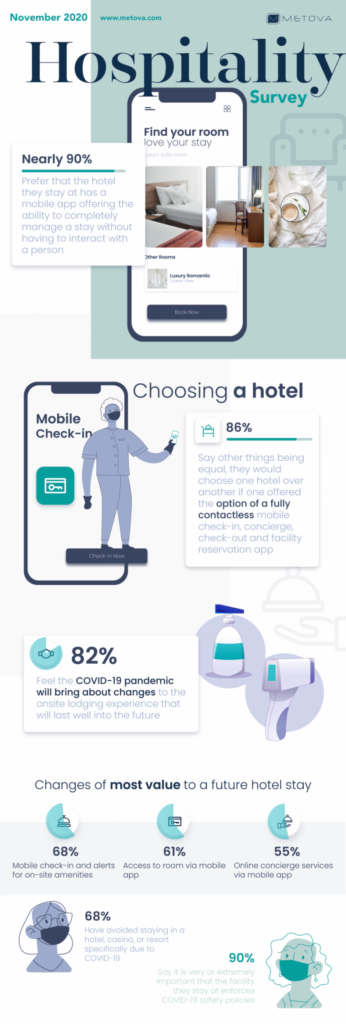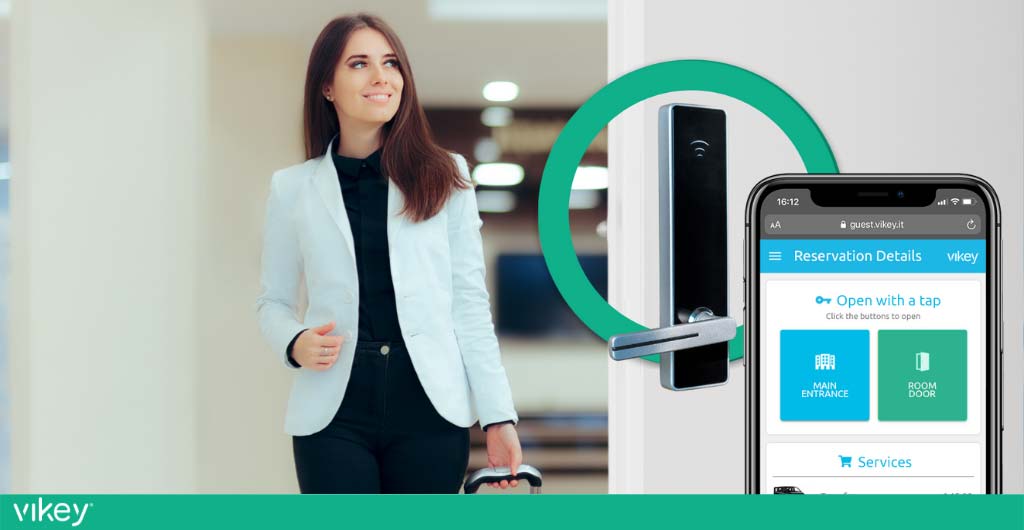In recent years, the hotel industry has seen its services revolutionised by technological innovation. This includes Self Check-in, meaning automatic check-in which allows guests to enter the room directly thanks to tools and home automation solutions provided by the hotels, apartments or B&Bs, thus avoiding having to interact directly with the staff of the accommodation facility.
Through Self Check-in, for example, it is possible to open the main doors, gates and the doors of apartments and rooms via an app or by entering a numerical combination, without the need for a team member on site upon arrival.
In the hospitality industry, face-to-face communication has always been an integral part of hospitality, but given the caution needed in times of the Covid-19 pandemic, with respect to social distancing, Self Check-in services have begun to generate strong interest among both hoteliers and hosts, as well as travelers. With Self Check-in, human contact is not eliminated but is merely postponed to a time that is not necessarily linked to the handing over of keys. As a result, some 86% of guests prefer hotels that provide contactless self-service features, such as mobile check-in, according to a study by Metova.

However, this interest in self-service technology began to grow even before the healthcare emergency, and the current crisis has only boosted this trend.
So let’s see what Self Check-in is all about, how it works and what the advantages and innovations are.
What is Self Check-in
Self Check-in is a procedure that allows guests to access their accommodation without necessarily having to meet the host or its employees on site, even outside normal check-in hours. It is undoubtedly a procedure that saves time and money for those who rent an apartment on Airbnb or a hotel and those who can manage it more efficiently even remotely, in favor of greater flexibility and independence for the guest.
How Self Check-in works
OTAs have taken immediate advantage of the opportunity to spread the word about Self Check-in among Property Managers, especially since many vacation rental and apartment owners manage their properties remotely and can’t always oversee the handover of keys when their guests arrive.
In help center for hosts of Airbnb we read precisely that, with Self Check-in guests can access the accommodation at any time even without the need for a host.
There are several ways to Self Check-in:
- By means of a code box, which is a security box placed outside the door of the accommodation and containing the keys. This system is not always the safest choice because it does not allow for the identification of guests prior to their entry, unless it is associated with an online check-in service;
- Smart locks that allow access via smartphone or numeric code that you type on a keypad and nfc (smart card) technology. The electronic lock communicates with the online check-in software so that, for each reservation, a digital key is created that allows you to open all doors and gates. A device connected to the intercom inside the accommodation will allow the entrance door to be opened. This solution is what Vikey offers, which eliminates quite the need for a physical key.
Self Check-in (with particular reference to Vikey’s advanced solution) is an example of intuitive, safe and fast virtual hospitality thanks to which guests can take possession of the accommodation without having to wait for the host, in total privacy and freedom of movement.
A new-found use of time for both travelers and owners who, spared from bureaucracy, can devote themselves to making their guests’ stay unique. Guaranteeing you better reviews!
Self Check-in: advantages
An interesting article published on Hospitality.net highlights the significant advantages of contactless and self-service technologies in the hospitality world.
Must-Have Contactless Self-service technologies for outstanding Guest Experience | By Bogdan Romashko – https://t.co/zDYPnODczu – https://t.co/zDYPnODczu
— Hospitality Net (@hospitalitynet) December 13, 2021
The advantages of implementing Self Check-in solutions are numerous and bring considerable benefits for hosts and guests.
Here are some advantages of Self Check-in that improve staff tasks and guest experience.
- Greater visibility on booking portals, where the presence of a Self Check-in system is one of the most used filters in the search for accommodation (source Airbnb).
- More revenue for hosts who will no longer have to give up last minute bookings or late check-ins just because they can’t go to the place to hand over the keys;
- Faster registration, payment and luggage storage operations: the check-in procedure becomes less stressful for both guests and reception staff;
- Time saving for both host and for guests who can independently manage their arrival. Being able to enter the house even if you are late, arrange your belongings and relax, is a very appreciated factor;
- Better use of hotel resources: platforms for the management of Self Check-in they are integrated into the PMS (Property Management System), the program used by hotel staff to manage room reservations, invoices, rates and more;
- Reduced risk of human errors: the Self Check-in automates the entire registration process, avoiding confusion in customer data. This helps to avoid unpleasant situations and to improve interaction with guests;
- No worries on the part of the guest about the supply of their documents and general information on arrival;
- Cutting-edge personalization: Self-service technology collects useful guest data in a way to be able to customize their experience in the best possible way;
- Respect for Health and Safety protocols: self-service technologies are the best to help the accommodation facilities reduce queues at reception and help maintain a safe distance between guests and employees. By eliminating the need for direct contact with team members, these new technologies help work in compliance with Covid-19 safety guidelines and protective measures.
Conclusions: Self Check-in and virtual Hospitality
2020, the year of the lockdown for the Covid-19 pandemic, has been defined as the Annus Horribilis of tourism.
However, one research conducted by Digital Innovation in Tourism Observatory of the School Of Management of the “Politecnico di Milano” presented as every year during the TTG Travel Experience in Rimini reveals that in 2021, the e-commerce side of tourism will reach 10.8 billion euros in Italy, up by + 51% compared to last year, with direct transactions going from 23% in 2019 to 47% in 2021.
Nel 2021 in Italia l’#eCommerce di #Viaggi ha ripreso a crescere, toccando quota 10,8 miliardi di euro (+51% rispetto all’anno scorso). Rimane ampio il divario con il periodo pre-pandemia, quando il comparto valeva 16,3 miliardi di € #oidt21 #obt21 #TTG2021 #travel pic.twitter.com/NuhmD80glW
— Osservatori Digital (@Osserv_Digital) October 14, 2021
Although the figures are still far from those of a couple of years ago, this is a good recovery for online travel, especially due to the growth of e-commerce in the hospitality sector.
Virtual Hospitality fits right into this context in which technology influences the hospitality industry in other ways.
For example, the pandemic has led to the emergence of a new type of traveler called “digital nomads“, who may travel on an ongoing basis while working online, and are now clamoring for self-service travel management solutions more than ever.
Not only Self Check-in, but home automation in general revolutionizes hospitality by leading to control of consumption and a virtual reception and concierge service always available to guests.
For many, the introduction of self-service technology seems to kill the very essence of hospitality. This doesn’t actually mean leaving guests unattended, in fact it can be very beneficial to both parties, as the property operates faster and guests gain more control over their stay.
Paradoxically, well-organized self-service experiences such as Self Check-in can increase customer loyalty and even help establish an emotional bond with the establishment.
The new hyper-connected traveler is looking for more frictionless solutions in the world of Travel and Hotellerie, that is, immediate and understandable shopping experiences, without friction in communication and in the use of the services offered.
Furthermore, if there is one thing that the pandemic has taught, it is that digital can become a great ally both to protect privacy and to guarantee the safety of guests: these are the areas in which innovative, smart and sustainable solutions, such as Self Check-in, can develop and grow.

